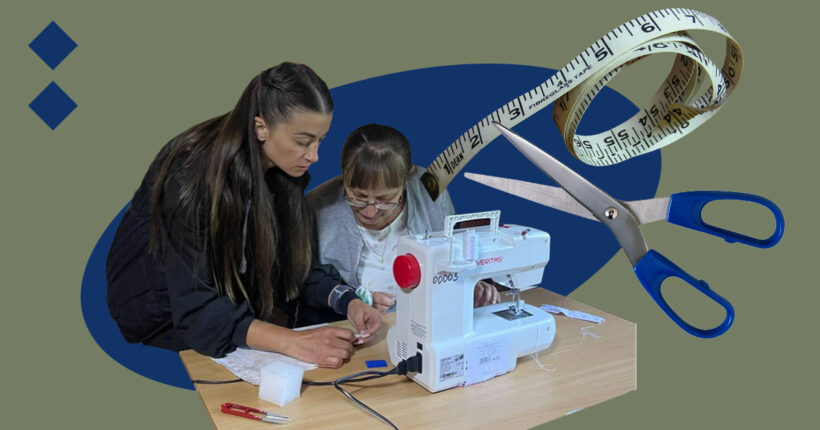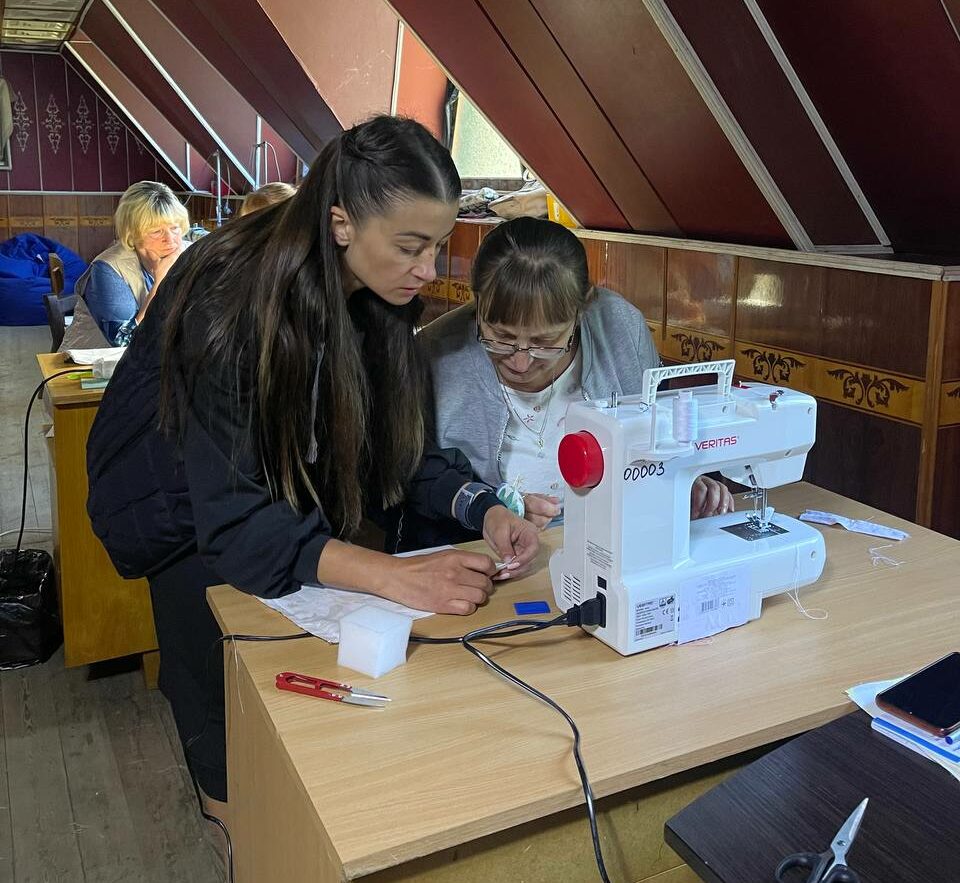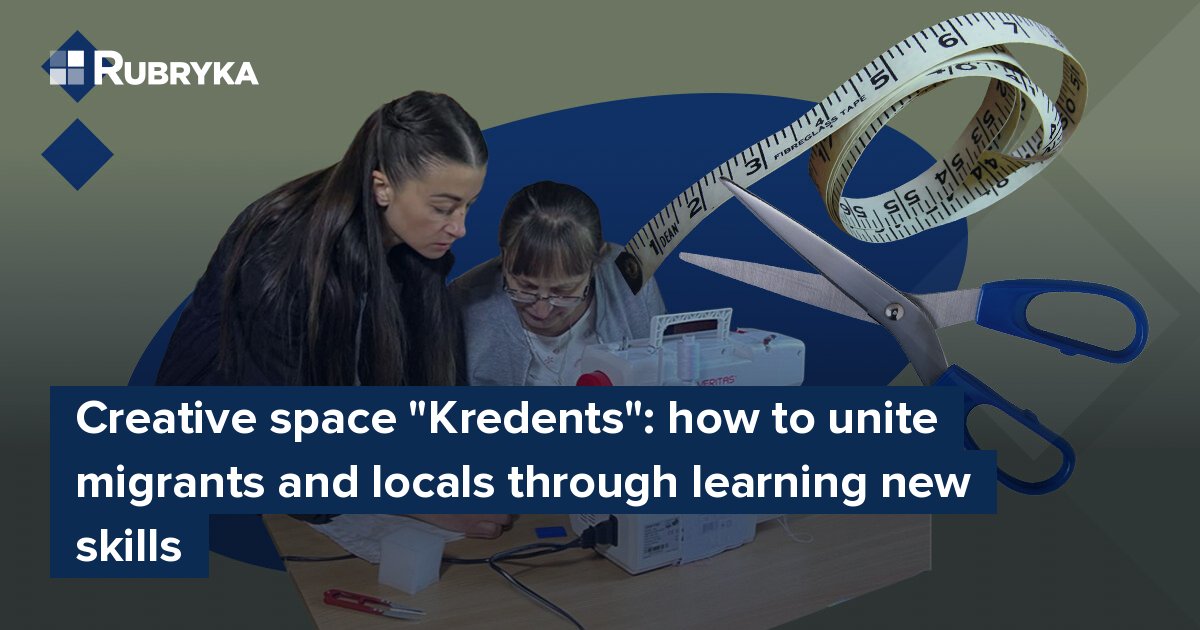
What is the problem?
Difficulties in self-realization of migrants in a new place
Although large waves of resettlement of war-affected people swept through the country last year, the process of their adaptation continues to this day. Of course, many people have already returned home, but many cannot do so yet, and those who have nowhere to return.
Once individuals have addressed their basic safety, shelter, and sustenance needs, they focus on employment and personal growth. However, in a different location, particularly a small community, it can be challenging to secure employment opportunities.
What is the solution?
Social activity of IDPs in a new place
Making new social connections, stepping out of our comfort zones, and being actively engaged can be difficult when the lines between the past and the future are blurred. Yet, the key is to live in the present. But, the truth is that there are plenty of opportunities within reach – often, local communities and projects bring together fascinating individuals who can help find different directions for moving forward.
How does it work?
Including IDPs in the activities of local organizations and initiatives
The village of Yasinia in Transcarpathia is home to "Kredents," a unique creative space. However, before opening its doors, the founders faced numerous challenges in obtaining the necessary approval from the local authorities, who failed to recognize the significance of such a space for the small village.
"Kredents" was intended to serve as a platform for the community to implement their ideas, a space for the growth and development of children and youth, and a "home" for public organizations. Despite facing bureaucratic obstacles and prejudice, "Kredents" successfully opened its doors in 2021, operating out of the Yasinia House of Culture. However, the space was in use only until the first frost, as the authorities didn't want to allocate funds for heating.
However, by noon on February 24, everybody already knew the meeting location. The space team and the community's leadership unanimously decided that "Kredents" would serve as the aid headquarters.
Svitlana Dzhunzhyk and Ilona Milchevych are volunteers for "Kredents." Svitlana assists the team in securing grants and preparing reports, while Ilona aids with project management and coordinating team involvement.

This is a photo from the "Kredenets" team archive featuring Ilona and Svitlana in the middle.
"The second time around, we had to open without heating. No one cared about how it would work or how terrible the cold was – people just volunteered. We had to figure out the schedule and make changes by the hour," Svitlana remembers.
"The volunteers wrote in the chat that someone needed to accept the help that people brought. I said when it was convenient for me and came. I still recall how bitterly cold it was there. After arriving, I removed my shoes and sat down, waiting. It was a tough situation for everyone. We were all uncertain about what was going on and how to respond," Ilona explains.
The team quickly adapted their processes – distributing humanitarian aid on site and delivering it to the district. Volunteers also drove aid trucks to Uzhhorod and Slovakia and organized donations from locals. At the same time, those who had been displaced began to join the headquarters' efforts.
"Even though it goes against the rules of the humanitarian sector, we engaged displaced persons. We could have 500-700 individuals show up for distribution in a single day. We worked every day, but we still did not have enough physical strength. As a result, it was common for us to have 10–12 volunteers, some of whom were IDPs," Svitlana explains. "On the other hand, it's easier to accept help when you've also contributed to it. It can boost your self-esteem and increase your sense of worth. In fact, many people have participated in these small acts of assistance – like distribution, unloading, and organizing – themselves."

Humanitarian headquarters. Photo from the team archive
While "Kredents" became a humanitarian hub, it continued to foster creativity. The volunteers came from all corners of Ukraine and from different fields. Yet, as they conversed about volunteer work, they began to share ideas for events and projects. Furthermore, while distributing humanitarian aid, numerous internally displaced persons expressed curiosity about the purpose of the space and its potential uses.
As time went on and less humanitarian aid was received, the people of "Kredents" returned to their regular routines as if the war had never happened. The space team and the resettlers joined forces to plan and execute a range of activities, such as dance and English lessons, sports tournaments, movie nights, collecting Ukrainian books for libraries, providing project management training, organizing psychological activities, and even embarking on a hike to Hoverla. They also hosted a "Stare Yasynia" integration event that brought together 150 local and new community participants.
"Overall, I really enjoy IDPs," Ilona says. "When we have a conversation like after an event, members of our community typically have different, but mostly similar viewpoints. However, newcomers see things from a different perspective, and when you listen, you think, 'Oh, I see.'"
The volunteers from "Kredents" also went to schools, talking to the children about their work and playing with them. Ilona says it's gratifying to see how they can redirect the children's attention to something positive. She recalls a particular memory of two girls who came to visit their class.
"We stayed there for a bit, had a wonderful time, and have already returned to "Kredents". While we were there, one of the girls approached us with a drawing she had made of Olia, another volunteer, and me. At first, these girls didn't come to Kredents very often. I discussed their behavior in the classroom with their teacher. Initially, they were quiet and sat next to each other. However, as they started attending Kredents and interacting with new people, we could have conversations with them, and they became more outgoing in the classroom as well. It was truly heartwarming to see this change in them."
As the team reflects on all their work, they realize that it was not for nothing and that their work truly benefits others.
"Before the full-scale war, we battled for our survival and demonstrated our purpose for existence. I hope we succeeded," Svitlana says with a smile.
Does it really work?
We aim to motivate people to get involved, much like "Kredents"
Before the full-scale war, Yana Chebanenko lived with her family in Chernihiv. The woman is a professional seamstress but had to take on other jobs due to the low pay. During the intense battles in the city, Yana sought refuge with her family in the basement. When the chance arose to escape, they headed to her father's place in Yasinia, Transcarpathia.
Yana first encountered "Kredents" when she went to ask for help.
"Even though we have family in this area, we arrived with only the clothes on our backs. We didn't even have spare clothing," Yana explains. "We didn't have enough pillows since our large group of family and friends all came together. Luckily, we discovered that "Kredents" provided everything they possibly could."
Yana sought help on multiple occasions and was assisted by caring volunteers who never left her to deal with her problems alone. After recovering, she decided to become a volunteer herself. However, "Kredents" already had ample volunteers, so she chose to offer her assistance in the volunteer kitchen at the "Hearts of Angels" Charitable Fund.
Yana, along with a group of other women, could prepare 150 meals every day for IDPs. The kitchen worked together with "Kredents," and volunteers would share their experiences and information about those in need. This is how the volunteers and the kitchen staff became friends.
"There were a lot of people in the kitchen, each with their own sorrows and struggles,"Yana says."I found solace in spending time with the girls from "Kredents," since they work in the kitchen and come to visit me as friends." I knew this time would be uplifting. The girls were always welcoming, offering tea, coffee, treats, and comfortable seating with blankets. It was a cozy and enjoyable group, and there was always something new to discover."
The volunteers from the "Hearts of Angels" Charitable Fund were also part of the effort to weave camouflage nets. Community members donated used bedding, some of which were still in good condition. The volunteers started sewing underwear for the hospital's military patients but soon realized they needed more efficient machines and skilled craftspeople to make the garments even better. This led to the idea of creating a project proposal.
"Kredents" volunteers helped to prepare and submit an application for the project from "Kyiv Dialog." A positive response soon came, and Yana, as a craftswoman, took up the organization of sewing courses.
Sewing machines were purchased for classes, and rooms were set up in an old cinema. A maximum of 10 people — five local and five IDPs — could attend the courses. However, after the information about the recruitment spread throughout the village, many more willing people turned to Yana.

Yana (on the left) with one of her students. Photo from the heroine's archive.
"Our village is pretty small and doesn't have a studio nearby. If we need to get something fixed, we have to make the trip to Rakhiv (the nearest larger town) and pay 140 hryvnias for the trip only. Some women in our village have sewing machines, but they don't know how to use them or get them fixed. Unfortunately, we don't have a master in our village either," Yana explains.
During the classes, Yana assisted the students with setting up the machines and instructed them on the fundamentals of sewing and mending garments. But perhaps most significantly, she sparked their interest in a new activity.

One of the students. Photo from the team archive
"They're just like schoolchildren," Yana says with a smile. "They were all spying on each other, observing, and asking for advice. I was always there to lend a hand. They were laughing and chatting over tea. On the first day, they could barely scribble one line, but their work was impressive and seamless by the end. They mastered the fundamentals in the course; from there, it's all about using their imagination and having a desire to practice."
These courses were not only for individuals interested in sewing but also for IDPs and community members to connect and build relationships through volunteering.
"We offer free courses to encourage more individuals to volunteer and be more involved. We aim to motivate people to get involved, much like "Kredents," and not be apathetic, but to contribute in any way they can," Yana believes.

From a large production workshop to a small bakery: how a family from Sievierodonetsk continued their own business from scratch

"We need to get up and do something": teenagers create change in rebuilding Ukraine's communities






